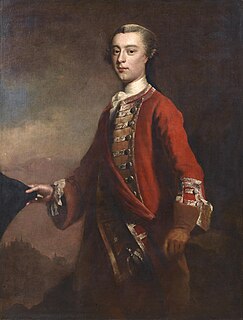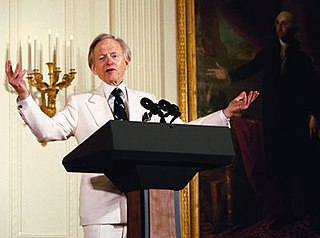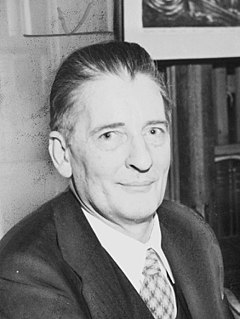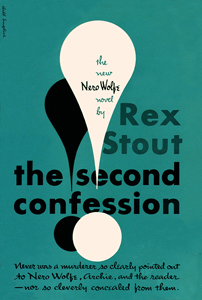
Nero Wolfe is a fictional character, a brilliant, oversized, eccentric armchair detective created in 1934 by American mystery writer Rex Stout. Wolfe was born in Montenegro and keeps his past murky. He lives in a luxurious brownstone on West 35th Street in New York City, and he is loath to leave his home for business or anything that would keep him from reading his books, tending his orchids, or eating the gourmet meals prepared by his chef, Fritz Brenner. Archie Goodwin, Wolfe's sharp-witted, dapper young confidential assistant with an eye for attractive women, narrates the cases and does the legwork for the detective genius.

Thomas Clayton Wolfe was an American novelist of the early twentieth century.

Theobald Wolfe Tone, posthumously known as Wolfe Tone, was a leading Irish revolutionary figure and one of the founding members of the United Irishmen, and is regarded as the father of Irish republicanism and leader of the 1798 Irish Rebellion. He was captured at Letterkenny port on 3 November 1798, and he died sixteen days later in unclear circumstances.

James Wolfe was a British Army officer known for his training reforms and remembered chiefly for his victory in 1759 over the French at the Battle of the Plains of Abraham in Quebec as a major general. The son of a distinguished general, Edward Wolfe, he received his first commission at a young age and saw extensive service in Europe where he fought during the War of the Austrian Succession. His service in Flanders and in Scotland, where he took part in the suppression of the Jacobite Rebellion, brought him to the attention of his superiors. The advancement of his career was halted by the Peace Treaty of 1748 and he spent much of the next eight years on garrison duty in the Scottish Highlands. Already a brigade major at the age of 18, he was a lieutenant-colonel by 23.

Thomas Kennerly Wolfe Jr. was an American author and journalist widely known for his association with New Journalism, a style of news writing and journalism developed in the 1960s and 1970s that incorporated literary techniques.

William Maxwell Evarts "Max" Perkins was an American book editor, best remembered for discovering authors Ernest Hemingway, F. Scott Fitzgerald and Thomas Wolfe.

William Cuthbertson "Billy" Wolfe was a Scottish accountant, manufacturer and Scottish National Party politician. He was the National Convenor (leader) of the Scottish National Party (SNP) from 1969–1979, playing a central role in the transformation of the SNP into a modern, progressive political movement, and in the development of the SNP’s social democratic political philosophy.
The Wolfe Tones are an Irish rebel music band that incorporates elements of Irish traditional music in their songs. They take their name from the Irish rebel and patriot Theobald Wolfe Tone, one of the leaders of the Irish Rebellion of 1798, with the double entendre of a wolf tone – a spurious sound that can affect instruments of the violin family.
New Journalism is a style of news writing and journalism, developed in the 1960s and 1970s, which uses literary techniques deemed unconventional at the time. It is characterized by a subjective perspective, a literary style reminiscent of long-form non-fiction and emphasizing "truth" over "facts", and intensive reportage in which reporters immersed themselves in the stories as they reported and wrote them. This was in contrast to traditional journalism where the journalist was typically "invisible" and facts are reported as objectively as possible. The phenomenon of New Journalism is generally considered to have ended by the early 1980s.

The Death of General Wolfe is a 1770 painting by Anglo-American artist Benjamin West, commemorating the 1759 Battle of Quebec, where General James Wolfe died at the moment of victory. The painting contains vivid suggestions of martyrdom, and broke a standard rule of historical portraiture by featuring individuals who had not been present at the scene, dressed in modern instead of classical costumes. The painting has become one of the best-known images in English art.

Hubert Blaine Wolfeschlegelsteinhausenbergerdorff Sr. is the abbreviated name of a typesetter who has held the record for the longest personal name ever used. Hubert's given name is made up from 27 names, each starting with a different letter of the alphabet in consecutive order; these are followed by an enormously long single-word surname. The exact length and spelling of his name has been a subject of considerable confusion due in part to its various renderings over the years, many of which are plagued by typographical errors. One of the longest and most reliable published versions, with a 988-letter surname, is as follows:
Adolph Blaine Charles David Earl Frederick Gerald Hubert Irvin John Kenneth Lloyd Martin Nero Oliver Paul Quincy Randolph Sherman Thomas Uncas Victor William Xerxes Yancy Zeus Wolfeschlegelsteinhausenbergerdorffwelchevoralternwarengewissenhaftschaferswessenschafewarenwohlgepflegeundsorgfaltigkeitbeschutzenvorangreifendurchihrraubgierigfeindewelchevoralternzwolfhunderttausendjahresvorandieerscheinenvonderersteerdemenschderraumschiffgenachtmittungsteinundsiebeniridiumelektrischmotorsgebrauchlichtalsseinursprungvonkraftgestartseinlangefahrthinzwischensternartigraumaufdersuchennachbarschaftdersternwelchegehabtbewohnbarplanetenkreisedrehensichundwohinderneuerassevonverstandigmenschlichkeitkonntefortpflanzenundsicherfreuenanlebenslanglichfreudeundruhemitnichteinfurchtvorangreifenvorandererintelligentgeschopfsvonhinzwischensternartigraum Sr.

The Second Confession is a Nero Wolfe detective novel by Rex Stout, first published by the Viking Press in 1949. The story was also collected in other omnibus volumes, including Triple Zeck. This is the second of three Nero Wolfe novels that involve crime boss Arnold Zeck – Wolfe's Moriarty. In this novel he telephones Wolfe to warn him off an investigation and retaliates when Wolfe refuses to cooperate. Though the crime is solved, the ending is left open.

The Right Stuff is a 1979 book by Tom Wolfe about the pilots engaged in U.S. postwar research with experimental rocket-powered, high-speed aircraft as well as documenting the stories of the first Project Mercury astronauts selected for the NASA space program. The Right Stuff is based on extensive research by Wolfe, who interviewed test pilots, the astronauts and their wives, among others. The story contrasts the "Mercury Seven" and their families with test pilots such as Chuck Yeager, who was considered by many contemporaries as the best of them all, but who was never selected as an astronaut.

The Siege of Louisbourg was a pivotal operation of the Seven Years' War in 1758 that ended the French colonial era in Atlantic Canada and led to the subsequent British campaign to capture Quebec in 1759 and the remainder of French North America the following year.

Nero Wolfe is an American drama television series based on the characters in Rex Stout's series of detective stories that aired on NBC from January 16 to August 25, 1981. William Conrad fills the role of the detective genius Nero Wolfe, and Lee Horsley is his assistant Archie Goodwin. Produced by Paramount Television, the series updates the world of Nero Wolfe to contemporary New York City and draws few of its stories from the Stout originals.

Nero Wolfe is a 1977 American made-for-television film adaptation of the Nero Wolfe novel The Doorbell Rang by Rex Stout. Thayer David stars as Nero Wolfe, gourmet, connoisseur and detective genius. Tom Mason costars as Archie Goodwin, Wolfe's assistant. Written and directed by Frank D. Gilroy, the made-for-TV movie was produced by Paramount Television as a pilot for an ABC television series, but the movie was shelved by the network for more than two years before finally being broadcast December 19, 1979.
Joan Luedders Wolfe is an environmental activist, having founded the West Michigan Environmental Action Council and coordinated the passage of the landmark Michigan Environmental Protection Act of 1970. She was also active in the passage of the National Environmental Policy Act. Both she and her husband, Willard E. Wolfe, DDS, were key strategists in writing and lobbying for passage of Michigan's Inland Lakes and Streams Act of 1972.

John McConnell Wolfe Jr. is an American attorney and perennial political candidate. He challenged President Barack Obama for the Democratic Party's 2012 presidential nomination. He ultimately emerged as the most successful challenger, receiving the second-highest number of delegates (23) and popular votes (116,639).
"Poison à la Carte" is a Nero Wolfe mystery novella by Rex Stout, first published in April 1960 in the short-story collection Three at Wolfe's Door.
The Wolfe Pack is a literary society devoted to Rex Stout's character Nero Wolfe.














